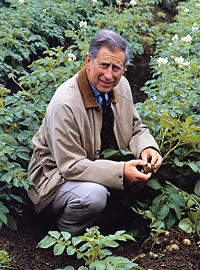The Speech
Excerpts from the Speech
Questioning the conventional worldview is a risky business. And the only reason I have done so is for the sake of your generation and for the integrity of Nature herself. It is your future that concerns me and that of your grandchildren, and theirs too. That is how far we should be looking ahead. I have no intention of being confronted by my grandchildren, demanding to know why on Earth we didn’t do something about the many problems that existed when we knew what was going wrong. . . .
Very nearly 30 years ago I began by talking about the issue, but I realized in the end I had to go further. I had to put my concern into action, to demonstrate how else we might do things so that we secure food production for the future, but also, crucially, to take care of the Earth that sustains us. Because if we don’t do that, if we do not work within Nature’s system, then Nature will fail to be the durable, continuously sustaining force she has always been. Only by safeguarding Nature’s resilience can we hope to have a resilient form of food production and ensure food security in the long term.
This is the challenge facing us. We have to maintain a supply of healthy food at affordable prices when there is mounting pressure on nearly every element affecting the process. In some cases we are pushing Nature’s life-support systems so far, they are struggling to cope with what we ask of them. Soils are being depleted, demand for water is growing ever more voracious, and the entire system is at the mercy of an increasingly fluctuating price of oil.
Remember that when we talk about agriculture and food production, we are talking about a complex and interrelated system and it is simply not possible to single out just one objective, like maximizing production, without also ensuring that the system which delivers those increased yields meets society’s other needs. . . . These should include the maintenance of public health, the safeguarding of rural employment, the protection of the environment, and contributing to overall quality of life.
So we must not shy away from the big questions. Chiefly, how can we create a more sustainable approach to agriculture while recognizing those wider and important social and economic parameters — an approach that is capable of feeding the world with a global population rapidly heading for 9 billion? And can we do so amid so many competing demands on land, in an increasingly volatile climate and when levels of the planet’s biodiversity are under such threat or in serious decline?
As I see it, these pressures mean we haven’t much choice in the matter. We are going to have to take some very brave steps. We will have to develop much more sustainable, or durable forms of food production because the way we have done things up to now are no longer as viable as they once appeared to be.

